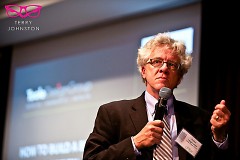On Friday, May 6, over 200 attendees and 25 exhibitors found themselves assembling at GVSU’s Eberhard Center for the Greater Grand Rapids Bicycle Coalition’s (GGRBC) 2011 Bicycle Summit. With the tagline “Inspiration to Action,” the event included a full day of speakers and workshops. GGRBC Board Chair Kevin McCurren noted the event served its purpose very well.
“A sense of excitement was noticeable from the beginning; you could feel the positive energy throughout the day,” said McCurren. “People really want action. They want to see physical changes on our streets and bridges so bicycling will be safer. The support of 34 financial and in-kind sponsors made it possible to host a quality event, and the exhibit area was full of activity. We had probably the largest bike expo Grand Rapids has seen.”
The audience in attendance was from a broad spectrum – novice and experienced bicycle commuters, college students and professors, millennials, longtime activists, representatives from cycling businesses and non-profits, and local government and agency officials.
“It was exciting to see so many people from local government,” said GGRBC Interim Director Tom Tilma. “They’re the ones who can implement the changes the public is demanding. I get the sense that those officials are supportive of what we want to see, and in turn we’re looking forward to supporting them as they begin to make the changes.”
The actions the GGRBC was looking to inspire through the event can be divided into three domains: individuals, businesses and government. On the individual level, the coalition encourages people in the area to commit to riding their bicycles and educating themselves on safety and the rules of the road, and to advocate with their own cities and townships. Businesses are encouraged to be supportive of their employees and their customers who ride their bicycles by providing facilities such as bicycle parking. In regards to government action, the GGRBC would like to see cities and townships develop official non-motorized plans and adopt “complete streets” resolutions and ordinances, which accommodate all modes of transportation (motor vehicles, busses, bicycles and pedestrians).
Included in the event’s schedule was morning keynote speaker Darwin Hindman, the nationally recognized bicycling advocate and former 15-year mayor of Columbia, Miss. who helped transform Columbia into a bicycle and pedestrian-friendly city.
“Grand Rapids is doing wonderful things,” said Hindman. “The city has things started and has a spectacular citizens group – that kind of backing is so helpful.”
The event’s afternoon keynote speaker was Seattle-based consultant Peter Lagerwey, a national leader in bicycle and pedestrian planning and design. Lagerwey gave the audience the advice to “never miss an opportunity,” as Grand Rapids has “a lot of space on its streets to do great things with bicycling.”
The event concluded with a summit reflections session, which included brainstorming and collecting attendees’ feedback about the next steps for Greater Grand Rapids. When asked what they want to see next, the audience wasted no time in providing answers. From designating existing shoulders as bike lanes and incorporating bike lanes into street and bridge construction plans, to more community events and education, the demand for implementation was clear.
“We hope the attendees will be motivated to participate in GGRBC’s advocacy and education work, explained Tilma. “For example, if there’s a public meeting at a city hall regarding a road diet or on-street bike lanes, we hope our members and supporters who live in that community will show up and let their elected officials know how much passion there is for bicycle-friendly improvements.”
The first Grand Rapids Bicycle Summit was held in April of 2009 and the GGRBC is considering hosting a summit every other year. The coalition encourages all who are interested, have questions or need resources to contact them. “We’re here to help,” said Tilma. “We’re hoping many people will get involved with our coalition and support our work financially and with their time.”
The Rapidian, a program of the 501(c)3 nonprofit Community Media Center, relies on the community’s support to help cover the cost of training reporters and publishing content.
We need your help.
If each of our readers and content creators who values this community platform help support its creation and maintenance, The Rapidian can continue to educate and facilitate a conversation around issues for years to come.
Please support The Rapidian and make a contribution today.


